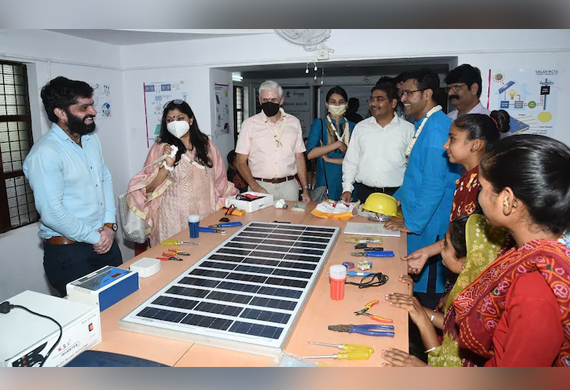
ReNew trains 1,000 Female Salt Pan Workers in Collaboration with UNEP and SEWA
By: WE Staff | Thursday, 30 June 2022
One thousand low-income women salt pan workers will be trained by the green energy company ReNew Power, the United Nations Environment Programme (UNEP), and the Self-Employed Women's Association of India (SEWA) to work in the renewable energy sector.
The three organisations said in a joint statement on Thursday that under the "Project Surya" initiative, women salt-pan workers who toil in the difficult conditions and sweltering heat of the Rann of Kutch marshes will receive training as solar panel and solar-pump technicians at Dhokavada village in the Patan district of Gujarat.
ReNew, in collaboration with UNEP and SEWA, "Project Surya" will train 1,000 low-income women who work in salt pans to employment in the renewable energy sector, according to the statement.
While SEWA is the project's principal implementation partner, ReNew is giving financial assistance and assistance in becoming familiar with its local renewable facility. UNEP will be in charge of project monitoring and evaluation.
In contrast to solar panel technicians, who may make up to Rs 18,000 (USD 130) per month, it is said that these ladies are currently able to save an average of Rs 10,000 (USD 128) in about 10 months.
ReNew's Chief Sustainability Officer, Vaishali Sinha, said: "this programme brings these inspiring women, who face real hardship in a traditional livelihood and earn a meagre income, into the heart of the clean energy transition to better their lives and brings them into the fight against climate change. This programme, that is scalable, is sustainability from the ground up, rather than top-down, and we are proud to partner with UNEP and SEWA to support this."
Team UN India is dedicated to assisting the sustainable energy transition for all through multi-partner initiatives like this one, benefiting from India's vibrant business sector and government leadership, according to Shombi Sharp, the UN Resident Coordinator in India.
Reema Nanavaty, SEWA, said "the green skills initiative will help SEWA move towards its 50 years resolve of building cleaner skies, cleaner air and cleaner water. Even though small, collectively the carbon footprints will make a significant contribution. The younger generation members of SEWA will get decent work and a life of dignity and self-respect."
Over 1.5 million low-income, independent female workers from 16 Indian states comprise the membership of SEWA, a national trade union.


.jpg)



